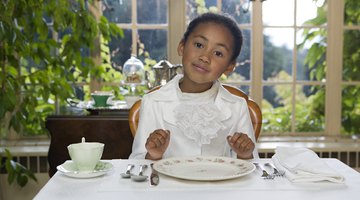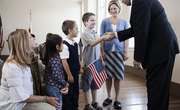Preschoolers are at a stage where they are becoming more social. They are beginning to understand some of the rules of social interaction. It's a good time to start teaching them about manners so they can increase their understanding of social expectations. Lessons that teach preschoolers about manners focus on simple concepts like saying "please" and "thank you" and can incorporate a variety of activities, including songs and crafts.
Talk about what manners are and how children can show them, such as by saying "please" when asking for something or "excuse me" when they make an embarrassing noise like a burp.
Brainstorm good manners together. Ask students to tell you about things they can do to show good manners, and write a big list of ideas on the board. You might cover sharing, covering their nose and mouth when they sneeze or cough, not reaching over people at the table, closing their mouths when they eat, not interrupting people when they talk and so on. If they become stuck for ideas, prompt them with certain scenarios, such as "eating dinner," and ask them what kind of manners are expected.
Sing fun songs to introduce these concepts and help preschoolers remember them. Child Care Lounge offers the example "Manners," sung to the tune of "I'm a Little Teapot:" I have super manners. Yes, I do. I can say "Please," and "Thank You," too. When I play with friends, I like to share. That's the way I show I care!
Create art that shows good manners. For example, children can create a collage of pictures of people showing manners, such as opening a door for someone or raising their hand to talk.
Put on a puppet show that demonstrates different situations in which manners may be used. Topics such as sharing, listening when people talk and saying "thank you" can all be included.
Assign group work or activities. Any activity -- such as creating artwork together, playing a game or building a tower -- can require preschoolers to take turns and to cooperate.
Write "thank you" notes together. Ask students to think of something that has recently happened for which they can say "thank you" to someone. For example, maybe they received a present for their birthday, or maybe they just want to say "thank you" to their mother for cooking a special dinner.
Host snack time. Before serving drinks or snacks, talk to students about what manners are expected, such as waiting their turn to be served, keeping their mouths closed while they eat and asking politely for seconds. Monitor students while they enjoy snack, and offer gentle reminders when they don't show manners.
Related Articles
References
Writer Bio
Maria Magher has been working as a professional writer since 2001. She has worked as an ESL teacher, a freshman composition teacher and an education reporter, writing for regional newspapers and online publications. She has written about parenting for Pampers and other websites. She has a Master's degree in English and creative writing.











